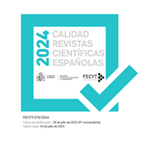Los masculinos no tan “genéricos”: estudios empíricos sobre interpretaciones en español y en francés
Resumen
En el debate sobre la validez del uso de los llamados “masculinos genéricos”, los posicionamientos académicos suelen hacer referencia a la interpretación de estas formas, generalmente sin citar estudios empíricos que examinen dichas interpretaciones. Estos estudios empíricos, que suelen ser dejados de lado en el debate, buscan examinar mediante experimentos o encuestas si las formas masculinas referentes a seres humanos generan una interpretación específica (referente únicamente a varones) o genérica (referente a seres humanos de cualquier sexo). El presente artículo de revisión propone remediar esa falta de atención a los aspectos empíricos del debate, revisando primero la literatura existente sobre el español y luego comparándola con la que trata datos del francés, conformando así un aparato de evidencia empírica adecuado para la discusión y comprensión de los debates actuales sobre (por ejemplo) la pertinencia o no del lenguaje inclusivo.
Descargas
Descarga artículo
Licencia
La revista Círculo de Lingüística Aplicada a la Comunicación, para fomentar el intercambio global del conocimiento, facilita el acceso sin restricciones a sus contenidos desde el momento de su publicación en la presente edición electrónica, y por eso es una revista de acceso abierto. Los originales publicados en esta revista son propiedad de la Universidad Complutense de Madrid y es obligatorio citar su procedencia en cualquier reproducción total o parcial. Todos los contenidos se distribuyen bajo una licencia de uso y distribución Creative Commons Reconocimiento 4.0 (CC BY 4.0). Esta circunstancia ha de hacerse constar expresamente de esta forma cuando sea necesario. Puede consultar la versión informativa y el texto legal de la licencia.











